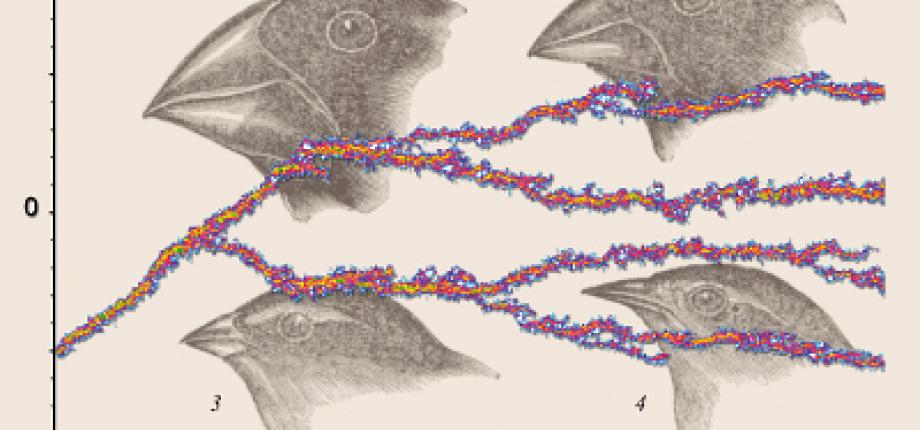Séminaire du Pôle Probabilités

Lieu : nouvelle salle de conférence du CMAP (salle 3005, dernier étage, aile 05 - soit le long couloir perpendiculaire à l’aile 0)
Horaire : un mardi sur deux, de 10h à 11h
Remarque : aux mêmes dates et dans la même salle, à 11h30, a lieu le séminaire du pôle Analyse.
Les organisateurs : Quentin Cormier, Stefano De Marco, Fabrice Djete & Charlotte Dion-Blanc.
(à contacter à l'alias orga-seminaire-pole-proba "at" meslistes.polytechnique.fr)
Prochaines séances :
____________________________________________________________
Anciens séminaires
2025-26
The eigenvalues of the complex Ginibre ensemble (matrices with i.i.d. complex Gaussian entries) form a highly correlated system of points; however, their high powers are distributed exactly as if they were independent. I will present a consequence of this counter-intuitive property to random permutations; more specifically, we will explicitly describe the distribution of the number of cycles in a commutator between a random (uniform) permutation and another permutation with prescribed cycle type.
Mardi 2 décembre : Djalil Chafaï (CEREMADE, Paris Dauphine; DMA, ENS)- Aspects of the Cutoff Phenomenon for Diffusions
The cutoff phenomenon, conceptualized in the context of finite Markov chains, states that for certain evolution equations, started from a point, the distance towards a long time equilibrium may become more and more abrupt in high dimensional state spaces and for certain choices of initial conditions. This can be seen as a critical competition between trend to equilibrium and initial condition. This talk is about the cutoff phenomenon for a few classes of linear and nonlinear diffusions. This is about joint works with Jeanne Boursier, and Cyril Labbé, with Max Fathi, and with Max Fathi and Nikita Simonov.
In this talk, we will introduce a dissipative version of the contact process with mean-field interaction admitting a simple epidemiological interpretation. In particular, we will focus on the thermodynamic limit of the process, providing a law of large numbers (propagation of chaos) and a central limit theorem for the corresponding normal fluctuations. These results reveal that it is the noise, which is only present in the finite-size system and is internal to the system, that induces persistent oscillatory behaviors reminiscent of the emergence of pandemic waves in real epidemics. The talk is based on a joint work with Paolo Dai Pra (University of Verona).
Plus précisément, deux espèces se déplacent, donnent naissance et meurent avec des taux dépendant de la densité locale de l'autre espèce, c'est à dire du nombre d'individus de l'autre espèce présent sur le même site. Nous cherchons à comparer la mesure empirique décrivant la distribution des deux espèces à un système déterministe de diffusion croisée (EDP type SKT), lorsque le nombre de sites et les populations locales deviennent grandes.
La difficulté majeure vient de la non linéarité dans la diffusion. L'approche repose sur la comparaison intermédiaire à un système discret semidiscret (EDO en dimension 2M). Les résultats s'appuient sur le développement d' estimations quantitatives de stabilité dans ce contexte (lemmes de dualité), le contrôle des martingales associées en norme Sobolev, et, pour la prise en compte des naissances et morts, sur l'obtention d' estimations de grandes déviations.
Ce exposé est basé sur des collaborations avec Ayman Moussa, Felipe Munoz, et Alexandre Bertolino.
2024-25
Mardi 24 juin : Charlotte Dion-Blanc (Sorbonne Université) - Nonparametric Estimation for Hawkes Diffusion Systems
Mardi 10 juin : Clément Foucart (Université Sorbonne Paris Nord) - Processus de branchement avec compétition en temps et espace continus et conditionnement à la non-extinction
Mardi 27 mai : Ahmed Kebaier (Université d'Evry) Approximation of Stochastic Volterra Équations with kernels of completely monotone type.
Mardi 29 avril : Pierre Le Bris (IHES) : On uniform in time propagation of chaos in the metastable Curie-Weiss model
Mardi 15 Avril : Nicolas Champagnat (Inria Nancy) - Convergence vers l'équation canonique de la dynamique adaptative d'un modèle individu-centré dans un régime de mutations petites mais fréquentes
Mardi 1 avril : Laurent Ménard (Modal'X, Paris Nanterre) - Mariages unimodulaires optimaux
Mardi 18 mars : Arvind Singh (LMO, Université-Paris-Saclay) - Jeu de Penney et jeu de Litt
Mardi 04 mars : Huyên Pham (CMAP) - Control of large-scale heterogeneous systems: an extended graphon mean-field approach
Mardi 04 février : Emmanuel Schertzer (University of Vienna) - Principe d'invariance en génétique des populations
Mardi 21 janvier : Guilherme Ost (Univ. Federal do Rio de Janeiro) - Binary graphical models with mean-field interactions: community detection and dependence graph density estimation
Mardi 07 janvier : Eva Loecherbach (Univ Paris 1) - Propagation du chaos conditionnelle pour des systèmes de particules avec des sauts stables
Mardi 17 décembre : Paul Gassiat (Paris Dauphine) - Un flot de gradient sur l'espace des contrôles avec condition initiale irrégulière
Mardi 03 décembre : Mehdi Talbi (Univ. Paris Cité) - Control of Volterra-type dynamics and applications to contract theory
Mardi 19 Novembre : Marek Kimmel (Rice University, Houston, Etats-Unis) - Estimating Past Events in Cancer Through Stochastic Modeling of DNA Sequencing Data
Mardi 5 Novembre : Arno Siri-Jégousse (UNAM Mexique) - Évolution et généalogies de populations autosimilaires
Mardi 22 Octobre : Michael Goldman (CMAP) - Recent progress on the optimal matching problem


